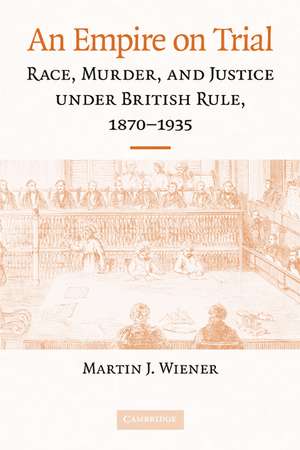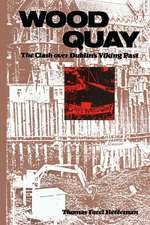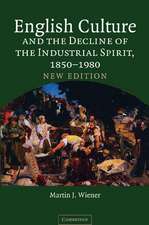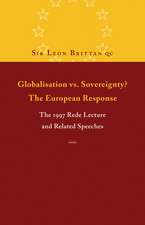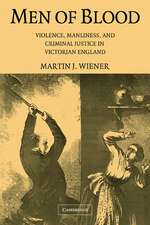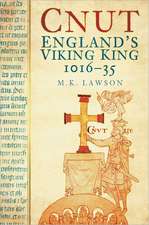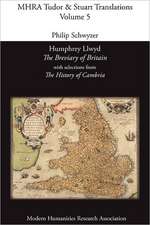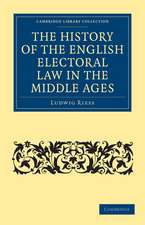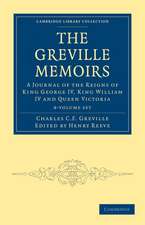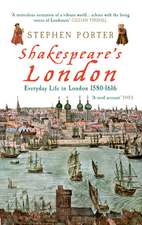An Empire on Trial: Race, Murder, and Justice under British Rule, 1870–1935
Autor Martin J. Wieneren Limba Engleză Paperback – 14 dec 2008
| Toate formatele și edițiile | Preț | Express |
|---|---|---|
| Paperback (1) | 203.50 lei 6-8 săpt. | |
| Cambridge University Press – 14 dec 2008 | 203.50 lei 6-8 săpt. | |
| Hardback (1) | 408.04 lei 3-5 săpt. | |
| Cambridge University Press – 7 dec 2008 | 408.04 lei 3-5 săpt. |
Preț: 203.50 lei
Nou
Puncte Express: 305
Preț estimativ în valută:
38.94€ • 40.77$ • 32.22£
38.94€ • 40.77$ • 32.22£
Carte tipărită la comandă
Livrare economică 05-19 aprilie
Preluare comenzi: 021 569.72.76
Specificații
ISBN-13: 9780521735070
ISBN-10: 0521735076
Pagini: 270
Dimensiuni: 152 x 228 x 14 mm
Greutate: 0.36 kg
Ediția:1
Editura: Cambridge University Press
Colecția Cambridge University Press
Locul publicării:New York, United States
ISBN-10: 0521735076
Pagini: 270
Dimensiuni: 152 x 228 x 14 mm
Greutate: 0.36 kg
Ediția:1
Editura: Cambridge University Press
Colecția Cambridge University Press
Locul publicării:New York, United States
Cuprins
1. On the high seas; 2. Queensland, 1869–1889; 3. Fiji, 1875–1885; 4. Trinidad and the Bahamas, 1886–1897; 5. India: the setting; 6. India: in the legal arena, 1889–1922; 7. Kenya, 1905–1934; 8. British Honduras 1934.
Recenzii
'With characteristic sagacity and verve, Martin Weiner tackles one of the central themes of modern British imperial history - the relationship between liberalism and empire. His wide-ranging and richly documented study of colonial interracial murder trials gives a human face to a subject too often approached as a theoretical abstraction. Vivid, nuanced, and provocative, this book challenges us to look more closely and think more carefully about racial domination and the rule of law in the British Empire.' Dane Kennedy, George Washington University
'This original and well-written study can be read with great profit by scholars of law and of Empire; it adds an important and long neglected dimension to both areas of study, and in the process reveals yet more of the rich and complex weft and warp of the history of British imperial rule.' David Killingray, Goldsmiths College, University of London
'In An Empire on Trial Martin Wiener gives us an absorbing account of the tension between the principles of British law and its rendering in the colonies. Wiener does a superb job of demonstrating the profound variation in colonial experience of the law and in revealing the ever fraught relationship between local and central objectives. His extraordinarily wide-ranging comparative approach, his carefully argued position, and his deep knowledge of the criminal law all serve to make this study an important and original contribution to legal and to imperial British history.' Philippa Levine, University of Southern California
'One of the many virtues of An Empire on Trial is the way it persuades the reader of the significance of the history of criminal justice and demonstrates the centrality of the law in Britain and colonial society. At another level Wiener interprets the evolution of the law in relation to new trends in the social, economic, and cultural history of Britain and the Empire in the nineteenth and twentieth centuries. The book is thus a historiographical landmark, but it will also be of interest to the general public because of its clear and compelling style and the dramatic focus on murder trials. In every way An Empire on Trial is a tour de force.' Wm. Roger Louis, University of Texas at Austin
'In this important, path-breaking, study in comparative colonial history, Professor Wiener engagingly and persuasively demonstrates the complex and conflicting pulls on the criminal justice systems of a range of multi-racial British colonies. Confidently steering between reductionist and complacent renderings of imperialism, he shows the extent to which British politicians, the Colonial Office, colonial officials, the judiciary, and, not least, the colonized, pushed for genuine equality before the law for all residents of these possessions, typically in the face of visceral opposition by European minorities with their own limited and self-interested vision of the rule of law and its protections.' John McLaren, Emeritus Professor of Law, University of Victoria, British Columbia
'This original and well-written study can be read with great profit by scholars of law and of Empire; it adds an important and long neglected dimension to both areas of study, and in the process reveals yet more of the rich and complex weft and warp of the history of British imperial rule.' David Killingray, Goldsmiths College, University of London
'In An Empire on Trial Martin Wiener gives us an absorbing account of the tension between the principles of British law and its rendering in the colonies. Wiener does a superb job of demonstrating the profound variation in colonial experience of the law and in revealing the ever fraught relationship between local and central objectives. His extraordinarily wide-ranging comparative approach, his carefully argued position, and his deep knowledge of the criminal law all serve to make this study an important and original contribution to legal and to imperial British history.' Philippa Levine, University of Southern California
'One of the many virtues of An Empire on Trial is the way it persuades the reader of the significance of the history of criminal justice and demonstrates the centrality of the law in Britain and colonial society. At another level Wiener interprets the evolution of the law in relation to new trends in the social, economic, and cultural history of Britain and the Empire in the nineteenth and twentieth centuries. The book is thus a historiographical landmark, but it will also be of interest to the general public because of its clear and compelling style and the dramatic focus on murder trials. In every way An Empire on Trial is a tour de force.' Wm. Roger Louis, University of Texas at Austin
'In this important, path-breaking, study in comparative colonial history, Professor Wiener engagingly and persuasively demonstrates the complex and conflicting pulls on the criminal justice systems of a range of multi-racial British colonies. Confidently steering between reductionist and complacent renderings of imperialism, he shows the extent to which British politicians, the Colonial Office, colonial officials, the judiciary, and, not least, the colonized, pushed for genuine equality before the law for all residents of these possessions, typically in the face of visceral opposition by European minorities with their own limited and self-interested vision of the rule of law and its protections.' John McLaren, Emeritus Professor of Law, University of Victoria, British Columbia
Notă biografică
Descriere
This book explores interracial homicide in the British Empire during its height - examining these incidents in each of seven colonies scattered throughout the world.
